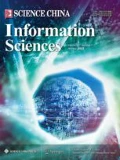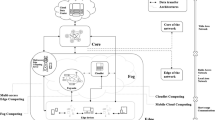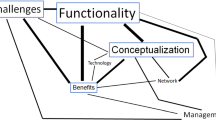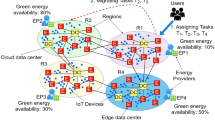Abstract
Mobile edge computing (MEC) provides a fresh opportunity to significantly reduce the latency and battery energy consumption of mobile applications. It does so by enabling the offloading of parts of the applications on mobile edges, which are located in close proximity to the mobile devices. Owing to the geographical distribution of mobile edges and the mobility of mobile devices, the runtime environment of MEC is highly complex and dynamic. As a result, it is challenging for application developers to support computation offloading in MEC compared with the traditional approach in mobile cloud computing, where applications use only the cloud for offloading. On the one hand, developers have to make the offloading adaptive to the changing environment, where the offloading should dynamically occur among available computation nodes. On the other hand, developers have to effectively determine the offloading scheme each time the environment changes. To address these challenges, this paper proposes an adaptive framework that supports mobile applications with offloading capabilities in MEC. First, based on our previous study (DPartner), a new design pattern is proposed to enable an application to be dynamically offloaded among mobile devices, mobile edges, and the cloud. Second, an estimation model is designed to automatically determine the offloading scheme. In this model, different parts of the application may be executed on different computation nodes. Finally, an adaptive offloading framework is implemented to support the design pattern and the estimation model. We evaluate our framework on two real-world applications. The results demonstrate that our approach can aid in reducing the response time by 8%–50% and energy consumption by 9%–51% for computation-intensive applications.
Similar content being viewed by others
References
Berglund M E, Duvall J, Dunne L E. A survey of the historical scope and current trends of wearable technology applications. In: Proceedings of ACM International Symposium on Wearable Computers, Heidelberg, 2016. 40–43
Yang F C, Li J L, Lei T, et al. Architecture and key technologies for Internet of vehicles: a survey. J Commun Inf Netw, 2017, 2: 1–17
Li P, Yu X, Peng X Y, et al. Fault-tolerant cooperative control for multiple UAVs based on sliding mode techniques. Sci China Inf Sci, 2017, 60: 070204
Mei H, Liu X Z. Software techniques for Internet computing: current situation and future trend. Chin Sci Bull, 2010, 55: 3510–3516
Yang K, Ou S M, Chen H H. On effective offloading services for resource-constrained mobile devices running heavier mobile Internet applications. IEEE Commun Mag, 2008, 46: 56–63
Paradiso J A, Starner T. Energy scavenging for mobile and wireless electronics. IEEE Pervasive Comput, 2005, 4: 18–27
Kumar K, Lu Y H. Cloud computing for mobile users. Computer, 2011, 43: 51–56
Goyal S, Carter J. A lightweight secure cyber foraging infrastructure for resource-constrained devices. In: Proceedings of Mobile Computing Systems and Applications, Windermere, 2004. 186–195
Balan R, Flinn J, Satyanarayanan M, et al. The case for cyber foraging. In: Proceedings of ACM Sigops European Workshop, Saint-Emilion, 2002. 87–92
Balan R K, Gergle D, Satyanarayanan M, et al. Simplifying cyber foraging for mobile devices. In: Proceedings of International Conference on Mobile Systems, Applications and Services, San Juan, 2007. 272–285
Balan R K, Satyanarayanan M, Park S Y, et al. Tactics-based remote execution for mobile computing. In: Proceedings of International Conference on Mobile Systems, Applications, and Services, San Francisco, 2003. 273–286
Gu X H, Nahrstedt K, Messer A, et al. Adaptive offloading inference for delivering applications in pervasive computing environments. In: Proceedings of IEEE International Conference on Pervasive Computing and Communications, Fort Worth, 2003. 107
Kumar K, Liu J B, Lu Y H, et al. A survey of computation offloading for mobile systems. Mobile Netw Appl, 2013, 18: 129–140
Philippsen M, Zenger M. JavaParty — transparent remote objects in Java. Concurrency-Pract Exper, 1997, 9: 1225–1242
Hunt G C, Scott M L. The coign automatic distributed partitioning system. In: Proceedings of Enterprise Distributed Object Computing Workshop, La Jolla, 1999. 252–262
Shi W S, Cao J, Zhang Q, et al. Edge computing: vision and challenges. IEEE Internet Things J, 2016, 3: 637–646
Chiang M, Zhang T. Fog and IoT: an overview of research opportunities. IEEE Internet Things J, 2016, 3: 854–864
Tran T X, Hajisami A, Pandey P, et al. Collaborative mobile edge computing in 5G networks: new paradigms, scenarios, and challenges. IEEE Commun Mag, 2017, 55: 54–61
Abbas N, Zhang Y, Taherkordi A, et al. Mobile edge computing: a survey. IEEE Internet Things J, 2018, 5: 450–465
Wang S G, Xu J L, Zhang N, et al. A survey on service migration in mobile edge computing. IEEE Access, 2018, 6: 23511–23528
Zhang Y, Huang G, Liu X Z, et al. Refactoring Android Java code for on-demand computation offloading. SIGPLAN Not, 2012, 47: 233
Chen X, Chen S H, Zeng X, et al. Framework for context-aware computation offloading in mobile cloud computing. J Cloud Comp, 2017, 6: 1
Chen X, Jiao L, Li W Z, et al. Efficient multi-user computation offloading for mobile-edge cloud computing. IEEE/ACM Trans Netw, 2016, 24: 2795–2808
Chen X. Decentralized computation offloading game for mobile cloud computing. IEEE Trans Parallel Distrib Syst, 2015, 26: 974–983
Lei T, Wang S G, Li J L, et al. AOM: adaptive mobile data traffic offloading for M2M networks. Pers Ubiquit Comput, 2016, 20: 863–873
Wang S G, Lei T, Zhang L Y, et al. Offloading mobile data traffic for QoS-aware service provision in vehicular cyber-physical systems. Future Gener Comput Syst, 2016, 61: 118–127
Kemp R, Palmer N, Kielmann T, et al. Cuckoo: a computation offloading framework for smartphones. In: Proceedings of International Conference on Mobile Computing, Applications, and Services, Santa Clara, 2010. 59–79
Cuervo E, Balasubramanian A, Cho D K, et al. Maui: making smartphones last longer with code offload. In: Proceedings of International Conference on Mobile Systems, Applications, and Services, San Francisco, 2010. 49–62
Kosta S, Aucinas A, Hui P, et al. Thinkair: dynamic resource allocation and parallel execution in the cloud for mobile code offloading. In: Proceedings IEEE INFOCOM, Orlando, 2012. 945–953
Chun B G, Ihm S, Maniatis P, et al. Clonecloud: elastic execution between mobile device and cloud. In: Proceedings of Conference on Computer Systems, Salzburg, 2011. 301–314
Zhou B W, Dastjerdi A V, Calheiros R N, et al. A context sensitive offloading scheme for mobile cloud computing service. In: Proceedings of IEEE International Conference on Cloud Computing, Washington, 2015. 869–876
Cheng Z X, Li P, Wang J B, et al. Just-in-time code offloading for wearable computing. IEEE Trans Emerg Top Comput, 2015, 3: 74–83
Jin X M, Liu Y N, Fan W H, et al. Multisite computation offloading in dynamic mobile cloud environments. Sci China Inf Sci, 2017, 60: 089301
Huang G, Cai H Q, Swiech M, et al. DelayDroid: an instrumented approach to reducing tail-time energy of Android apps. Sci China Inf Sci, 2017, 60: 012106
Acknowledgements
This work was supported by National Key R&D Program of China (Grant No. 2017YFB1002000), National Natural Science Foundation of China (Grant No. 61725201), and Talent Program of Fujian Province for Distinguished Young Scholars in Higher Education. Yun MA’s work was supported by China Postdoctoral Science Foundation.
Author information
Authors and Affiliations
Corresponding author
Rights and permissions
About this article
Cite this article
Chen, X., Chen, S., Ma, Y. et al. An adaptive offloading framework for Android applications in mobile edge computing. Sci. China Inf. Sci. 62, 82102 (2019). https://doi.org/10.1007/s11432-018-9749-8
Received:
Revised:
Accepted:
Published:
DOI: https://doi.org/10.1007/s11432-018-9749-8




